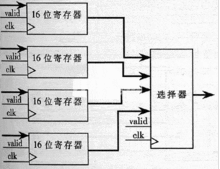IOS筆記061之二維碼的生成和掃描
編輯:IOS開發綜合
如今二維碼隨處可見,無論是實物商品還是各種禮券都少不了二維碼的身影。而手機等移動設備又成為二維碼的一個很好的應用平台,不管是生成二維碼還是掃碼二維碼。本篇文章從生成二維碼、掃描二維碼展開分析,通過內容分析二維碼用起來也很easy了。
首先說下生成二維碼
二維碼可以存放純文本、名片或者URL
其次生成二維碼的步驟:
導入CoreImage框架
再次通過濾鏡CIFilter生成二維碼
1、創建過濾器
2、恢復濾鏡的默認屬性
3、設置內容
4、獲取輸出文件
5、顯示二維碼
代碼實現 CoreImage
// 二維碼的生成 // 1、創建過濾器 CIFilter *filter = [CIFilter filterWithName:@"CIQRCodeGenerator"]; // 2、恢復濾鏡的默認屬性 [filter setDefaults]; // 3、設置內容 NSString *str = @"這是一個二維碼的生成結果"; NSData *data = [str dataUsingEncoding:NSUTF8StringEncoding]; // 使用KVO設置屬性 [filter setValue:data forKey:@"inputMessage"]; // 4、獲取輸出文件 CIImage *outputImage = [filter outputImage]; // 5、顯示二維碼 self.imageView.image = [UIImage imageWithCIImage:outputImage];
這樣顯示的圖片不是很清晰,可以自己重繪圖片
重新生成高清圖片:網上找即可,具體過程可暫時不關心
/**
* 根據CIImage生成指定大小的UIImage
*
* @param image CIImage
* @param size 圖片寬度
*/
- (UIImage *)createNonInterpolatedUIImageFormCIImage:(CIImage *)image withSize:(CGFloat) size
{
CGRect extent = CGRectIntegral(image.extent);
CGFloat scale = MIN(size/CGRectGetWidth(extent), size/CGRectGetHeight(extent));
// 1.創建bitmap;
size_t width = CGRectGetWidth(extent) * scale;
size_t height = CGRectGetHeight(extent) * scale;
CGColorSpaceRef cs = CGColorSpaceCreateDeviceGray();
CGContextRef bitmapRef = CGBitmapContextCreate(nil, width, height, 8, 0, cs, (CGBitmapInfo)kCGImageAlphaNone);
CIContext *context = [CIContext contextWithOptions:nil];
CGImageRef bitmapImage = [context createCGImage:image fromRect:extent];
CGContextSetInterpolationQuality(bitmapRef, kCGInterpolationNone);
CGContextScaleCTM(bitmapRef, scale, scale);
CGContextDrawImage(bitmapRef, extent, bitmapImage);
// 2.保存bitmap到圖片
CGImageRef scaledImage = CGBitmapContextCreateImage(bitmapRef);
CGContextRelease(bitmapRef);
CGImageRelease(bitmapImage);
return [UIImage imageWithCGImage:scaledImage];
}
還有就是設置內容為網址時,如果帶有協議頭的話,會自動打開網頁。
NSString *str = @http://www.baidu.com;
必須帶有協議頭才能打開
回到頂部
掃描二維碼
AVFoundation框架
二維碼的掃描過程
1、創建捕捉會話AVCaptureSession
添加輸入設備(數據從攝像頭輸入) AVCaptureDevice AVCaptureDeviceInput
2、添加輸出數據(示例對象-->類對象-->元類對象-->根元類對象) AVCaptureMetadataOutput
2.1.設置輸入元數據的類型(類型是二維碼數據) setMetadataObjectTypes
3、添加掃描圖層 AVCaptureVideoPreviewLayer
4、開始掃描 startRunning
5、實現回調代理方法,獲取掃描結果 captureOutput: :
#import "ViewController.h"
#import <AVFoundation/AVFoundation.h>
@interface ViewController () <AVCaptureMetadataOutputObjectsDelegate>
/**顯示圖層*/
@property (nonatomic, strong) AVCaptureVideoPreviewLayer *layer;
/**捕捉會話*/
@property (nonatomic, strong) AVCaptureSession *session;
@end
@implementation ViewController
- (void)touchesBegan:(NSSet *)touches withEvent:(UIEvent *)event
{
// 二維碼的掃描
// 1、創建捕捉會話
AVCaptureSession *session = [[AVCaptureSession alloc] init];
self.session = session;
// 2.添加輸入設備(數據從攝像頭輸入)
AVCaptureDevice *device = [AVCaptureDevice defaultDeviceWithMediaType:AVMediaTypeVideo];
AVCaptureDeviceInput *input = [AVCaptureDeviceInput deviceInputWithDevice:device error:nil];
[session addInput:input];
// 3、添加輸出數據(示例對象-->類對象-->元類對象-->根元類對象)
AVCaptureMetadataOutput *output = [[AVCaptureMetadataOutput alloc] init];
[output setMetadataObjectsDelegate:self queue:dispatch_get_main_queue()];
[session addOutput:output];
// 3.1.設置輸入元數據的類型(類型是二維碼數據)
[output setMetadataObjectTypes:@[AVMetadataObjectTypeQRCode]];
// 4、添加掃描圖層
AVCaptureVideoPreviewLayer *layer = [AVCaptureVideoPreviewLayer layerWithSession:session];
layer.frame = self.view.bounds;
[self.view.layer addSublayer:layer];
self.layer = layer;
// 5、開始掃描
[session startRunning];
}
/**
* 實現output的回調方法
*/
- (void)captureOutput:(AVCaptureOutput *)captureOutput didOutputMetadataObjects:(NSArray *)metadataObjects fromConnection:(AVCaptureConnection *)connection
{
// 數組metadataObjects中存放結果數據
if (metadataObjects.count > 0) {
// 獲取最終的讀取結果
AVMetadataMachineReadableCodeObject *object = [metadataObjects lastObject];
NSLog(@"%@",object.stringValue);
[self.session stopRunning];
[self.layer removeFromSuperlayer];
}
else
{
NSLog(@"沒有掃描到數據");
}
}
總結一句話:這個二維碼使用起來也不難
本文就到此為止,IOS筆記061之二維碼的生成和掃描希望在今後的工作和學習能夠幫助到大家。下面文章給大家分享如何在蘋果iOS設備上使用二維碼,需要了解的朋友點擊這裡。
相關文章
+



